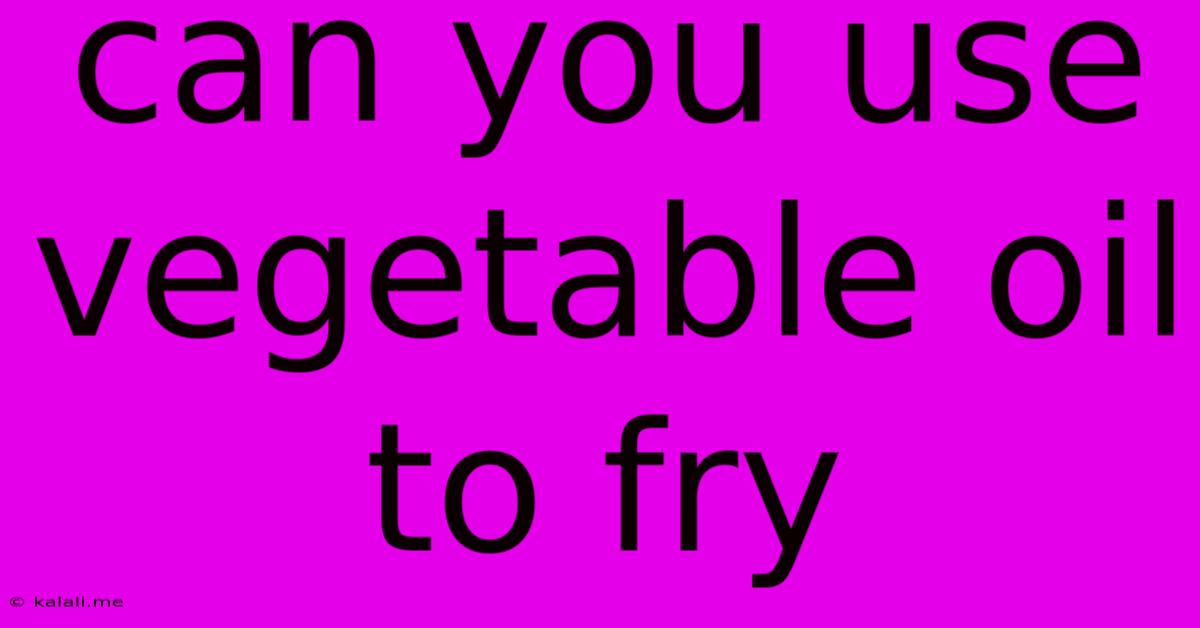Can You Use Vegetable Oil To Fry
Kalali
May 29, 2025 · 3 min read

Table of Contents
Can You Use Vegetable Oil to Fry? A Deep Dive into Frying Oils
Can you use vegetable oil for frying? The short answer is yes, but the longer answer is a bit more nuanced. Vegetable oil is a popular choice for frying, thanks to its relatively neutral flavor and affordability. However, understanding its properties and limitations is crucial for achieving crispy, delicious results and ensuring food safety. This article explores the suitability of vegetable oil for frying, considering its smoke point, flavor profile, and overall performance compared to other options.
Understanding the Smoke Point
The smoke point of an oil is the temperature at which it begins to break down and smoke. This is a critical factor in frying, as exceeding the smoke point produces harmful compounds and imparts an unpleasant, acrid taste to your food. Vegetable oil typically has a smoke point around 400°F (204°C), which is suitable for many frying applications. However, factors like age and repeated use can lower this point. Using oil that has reached or surpassed its smoke point is strongly discouraged.
Flavor and Aroma
Vegetable oil boasts a relatively neutral flavor, making it a versatile option for frying a wide variety of foods. This is a major advantage compared to oils with stronger flavors like olive oil, which might overpower the taste of the food. Its lack of strong aroma also ensures that the fried food's natural flavors are not masked.
Types of Vegetable Oil and Their Suitability
The term "vegetable oil" is quite broad. It encompasses oils derived from various sources, including soybean, canola, sunflower, and corn. While their smoke points are generally similar, some minor differences in flavor profiles and fatty acid compositions exist. For instance, canola oil is often favored for its higher monounsaturated fat content. The best type of vegetable oil for frying ultimately depends on your personal preference and the specific recipe.
Advantages of Using Vegetable Oil for Frying:
- High Smoke Point: Provides a wide temperature range for frying, suitable for most recipes.
- Neutral Flavor: Doesn't overpower the taste of the food being fried.
- Affordability: Generally less expensive than other frying oils like avocado or coconut oil.
- Wide Availability: Easily accessible in most grocery stores.
Disadvantages of Using Vegetable Oil for Frying:
- Lower Nutritional Value (compared to some other oils): While vegetable oil provides some essential fatty acids, other options like avocado oil offer a richer profile of nutrients.
- Potential for Oxidation: Repeated use or exposure to high heat can lead to oxidation, reducing the oil's quality and potentially creating harmful compounds.
- Less Flavorful (compared to some other oils): This can be an advantage or disadvantage depending on personal preference and the recipe.
Best Practices for Using Vegetable Oil for Frying:
- Use fresh oil: Avoid using oil that has been repeatedly heated or stored improperly.
- Don't overheat: Maintain the oil temperature within its safe range to prevent smoking and degradation.
- Filter the oil: After frying, strain the oil to remove food particles that can lower the smoke point and contribute to off-flavors.
- Proper storage: Store unused oil in a cool, dark place in a tightly sealed container.
Alternatives to Vegetable Oil for Frying:
While vegetable oil is a reliable option, other oils like canola, peanut, avocado, and coconut oil also work well for frying, each with its own unique properties and smoke points. The ideal oil will depend on factors such as desired flavor, nutritional considerations, and the type of food being prepared.
In conclusion, vegetable oil is a suitable and widely available option for frying. By understanding its smoke point, using fresh oil, and following best practices, you can achieve crispy, flavorful results while maintaining food safety. However, exploring other frying oils might broaden your culinary horizons and allow you to experiment with different flavor profiles and nutritional benefits.
Latest Posts
Latest Posts
-
P Implies Q Is Equivalent To
May 30, 2025
-
How To Lock Keyboard On Mac
May 30, 2025
-
How To Know Determinacy For Beams
May 30, 2025
-
Shall He Find Faith On The Earth
May 30, 2025
-
What Address To Use On Drivers License
May 30, 2025
Related Post
Thank you for visiting our website which covers about Can You Use Vegetable Oil To Fry . We hope the information provided has been useful to you. Feel free to contact us if you have any questions or need further assistance. See you next time and don't miss to bookmark.